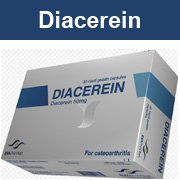
Diacerein – Mode of Action
The mechanism of action Diacerein defers from the nonsteroidal anti-inflammatory drugs since it is not related to the inhibition of the synthesis of the prostaglandins. Anti-osteoarthritic and cartilage-stimulating properties have been demonstrated in vitro and in models animals.
Diacerein and rhein have been shown to inhibit the production of interleukin-1 beta by human monocytes and the effects of the cytokine on chondrocytes in vivo. They exert chondroprotective effects in cultured articular cartilage and reduce severity of cartilage, bone, and synovial membrane damage in osteoarthritis. There appear to be some inhibitory effects on leucocyte migration and activation, contributing to the weak anti-inflammatory activity of the drug.
Studies indicate that Diacerein does not block the synthesis of prostaglandin, thromboxanes, or leukotrience but may actually stimulate prostaglandin synthesis, especially PGF-2 alpha, a prostaglandin with cytoprotective effect on the gastric mucosa (see Diacerein Side Effects). Diacerein in therapeutic doses inhibits the stimulation of interleukin-1 beta production and production of nitrous oxide. It also significantly reduces severity of pathological changes of osteoarthritis compared to placebo and increases the expression of transforming growth factor (TGF)-beta 1 and TGF-beta 2, with potential cartilage repairing properties. Diacerein does not alter renal or platelet cyclo-oxygenase activity and may therefore be tolerated by patients with prostaglandin-dependent renal function.
Leave A Comment